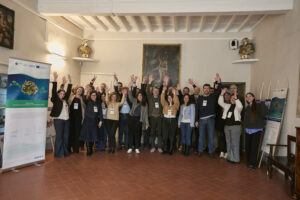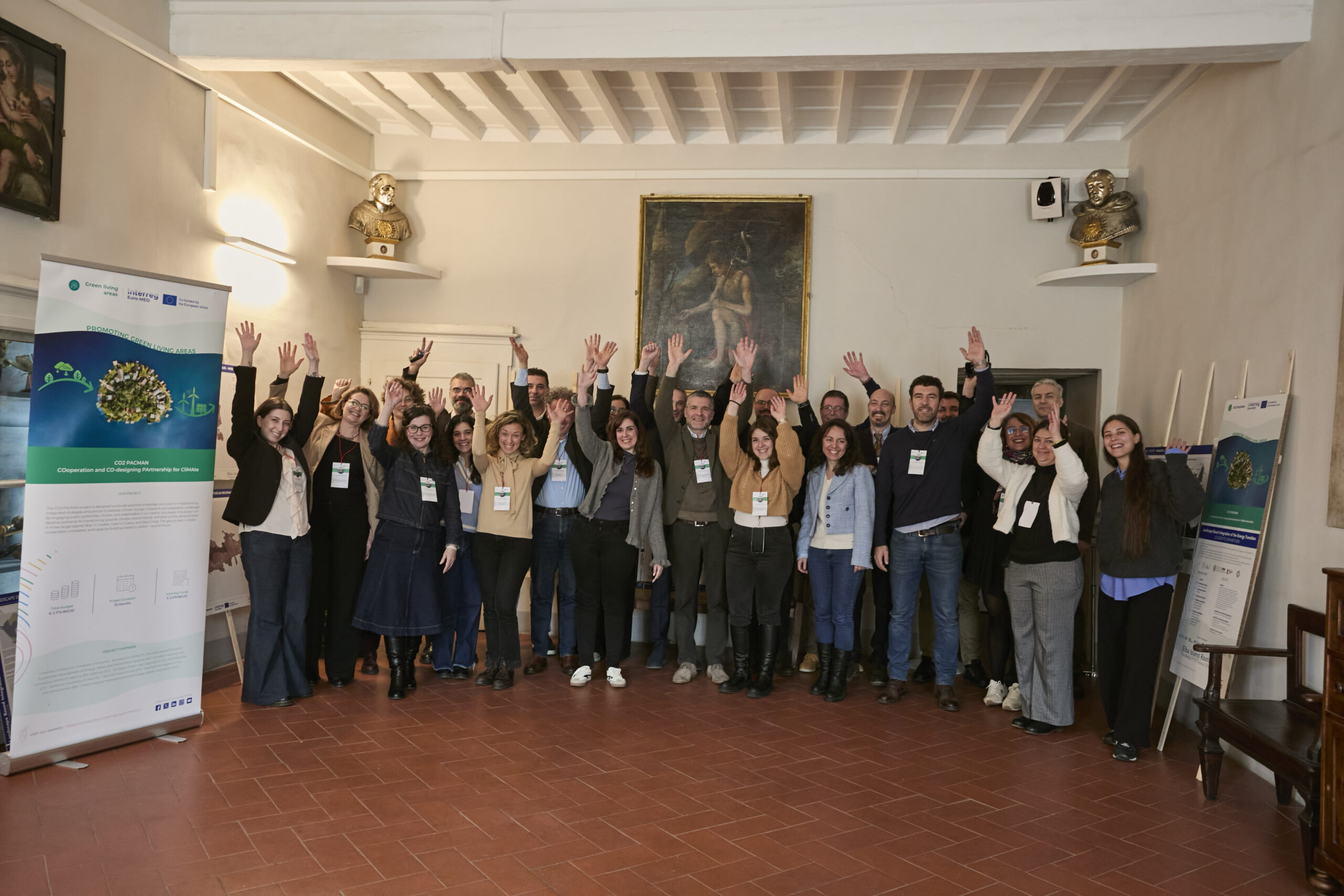
3rd Rooting Lab of the CO2 PACMAN Project Concludes
Cooperation, innovation and sustainability
for the Climate Neutrality of the Elba Island
Florence, February 27, 2025 – On February 13, the 3rd Rooting Lab of CO2 PACMAN, the European project funded by the Interreg Euro-MED program, concluded in “Sala Blu” of Fuligno (Fondazione Montedomini) in Florence. The project envisions decarbonization scenarios for Mediterranean islands. A hundred participants, including partners, administrators, institutional representatives, entrepreneurs, associations, and citizens, took part in three days of meetings and discussions on the Island of Elba (February 11-12) and in Florence (February 13) to promote sustainable and resilient communities through strategic tools and effective policies in the field of decarbonization.
The Florence session, coordinated by Professor Paolinelli from the Department of Architecture at the University of Florence, successfully acted as a bridge between the local and the regional authorities, while also opening the dialogue to the European dimension. Particularly relevant was the panel dedicated to exploring the European framework for decarbonization actions. Through the authoritative voices of Simone Borghesi, Attilio Piattelli, and George Papandreou, the discussion outlined the key achievements and main challenges we face today, reaffirming the need to give the Mediterranean region priority attention, exactly as CO2 PACMAN does. “Working towards greater social acceptability, understanding and managing the region’s critical issues, addressing growing inequalities, and adapting to climate change are goals that require an integrated approach,” stated Simone Borghesi, President of the Mediterranean Association of Environmental and Resource Economists (MEDAERE) and Director of the Florence School of Regulation – Climate. For this reason, organizations like MEDAERE, a transnational association that brings together researchers to develop shared solutions beyond national borders, serve as a virtuous example and a valuable interlocutor for cooperation projects. Attilio Piattelli, President of the FREE Coordination, provided an insightful summary of the progress made at the national level regarding Renewable Energy Sources. He emphasized the need to bridge gaps in industrial policies and support mechanisms, which currently represent major barriers to the sector’s growth. George Papandreou, President of the Circle the Med Forum and former Prime Minister of Greece, highlighted the crucial role of active citizen, business, and local government engagement in shaping effective climate solutions. He stressed that a participatory approach can lead to tangible actions, directly contributing to the European Green Deal and broader sustainability goals.
At the regional level, key insights emerged from the panel discussion “Towards energy transition: the role of regional authorities and legislative challenges,” moderated by Antonino Palumbo (Repubblica Firenze). With the participation of key institutional stakeholders, including the Tuscany Region, the Superintendence, local administrations, businesses, associations, and universities, the discussion reinforced the project’s potential to inform ongoing regional and national ecological transition policies. Speakers such as Raffaella Bisconti (SUN AGRI ITALIA), Pietro Rubellini (Director of ARPAT), Simone Tartaro (ARRR), David Tei (Tuscany Region), Domenico Zaccaria (Superintendence for the Provinces of Pisa and Livorno), and Silvia Viviani (Municipality of Livorno) all expressed a shared commitment to strengthening synergies and fostering dialogue. Their interventions underscored the need to overcome bureaucratic obstacles and drive meaningful regulatory innovations to support the energy transition.
“For the agrivoltaics niche, it would be essential for companies with specific expertise to be involved or at least heard during the drafting of new regulations and decrees at the regional and central levels. When this rarely happens, the difference is noticeable in terms of authorization and implementation,” said Raffaella Bisconti on the topic of agrivoltaics, a field where interesting opportunities could arise when projects are addressed in detail. The Superintendence (Provinces of Livorno and Pisa) also emphasized the centrality of the project when Domenico Zaccaria highlighted the need to work on the quality of solutions in collaboration with the entities responsible for protection, while simultaneously fostering technical and cultural innovation. This becomes even more urgent in the field of planning. Silvia Viviani, former INU (National Institute of Urban Planning) president and currently serving her second term as Livorno’s urban planning councilor, presented the virtuous example of the city’s Operating Plan, which has placed the ecological and social transition at the core of political action. She stressed the necessity of developing solutions capable of overcoming restrictive and standardized approaches to effectively implement the transition. Regarding suitable areas for renewable energy sources (FER), for example, “the Municipality of Livorno proposes forms of governance and territorial energy equalization to balance the general objectives of the energy transition with the equally general goals of environmental, landscape, and Tuscan agricultural production protection. The aim is to ensure that the energy transition is fair, tailored to territorial characteristics and capable of overcoming the sectoral approach of ‘separate planning,’ which unfortunately remains a dominant trait in our country.” This perspective was positively echoed by the contributions from the Energy Transition sector of the Tuscany Region, ARRR, and ARPAT, whose openness to such an approach is promising for the alliances that CO2 PACMAN has begun to build.
Simone Bastianoni, project coordinator and professor at the University of Siena, reaffirmed CO2 PACMAN’s central role in providing concrete tools for island decarbonization (CO2 PACMAN tool). He emphasized the project’s co-creation approach, actively involving institutions, citizens, students, and businesses to ensure maximum social sustainability in the transition process. One of CO2 PACMAN’s key strengths is its ability to communicate scientific data clearly and effectively, transforming rigorous research into actionable policy tools.
The meeting proved highly productive, setting the stage for upcoming discussions focused on real-world experimentation on the Island of Elba. Among the planned initiatives is a dedicated Open Innovation Workshop in Valencia this June, followed by the final “The Island I Would Like” labs, which will take place in 2025 across the pilot islands studied in the Rooting Labs. These sessions aim to translate analysis and assessments into tangible future scenarios, shaping the sustainable development of Mediterranean islands.
__________________________________________________________________________________
The program and all project details are available on the official websites and social media channels of CO2 PACMAN.
- Facebook: https://www.facebook.com/profile.php?id=61557383186450
- Instagram: https://www.instagram.com/co2pacman/
- LinkedIn: https://www.linkedin.com/company/102208512/admin/feed/posts/
- YouTube: https://www.youtube.com/@CO2PACMAN
- Sito del progetto: https://co2pacman.interreg-euro-med.eu/


